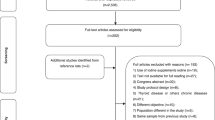Abstract
VITAMIN A is widely employed in clinical practice and is also used extensively as a teratogenic agent for the production and study of fœtal abnormalities in laboratory animals1.
This is a preview of subscription content, access via your institution
Access options
Subscribe to this journal
Receive 51 print issues and online access
$199.00 per year
only $3.90 per issue
Buy this article
- Purchase on Springer Link
- Instant access to full article PDF
Prices may be subject to local taxes which are calculated during checkout
Similar content being viewed by others
References
Cohlan, S. Q., Science, 117, 535 (1953).
Bicknell, F., and Prescott, F., “The Vitamins in Medicine” (Heinemann, 1947).
Brown, R. A., and Sturtevant, M., Vitamins and Hormones, 7, 171 (1949).
Woollam, D. H. M., and Millen, J. W., Brit. Med. J., ii, 197 (1957).
Giroud, A., and Martinet, M., Arch. Anat. Micro., 45, 77 (1956).
Author information
Authors and Affiliations
Rights and permissions
About this article
Cite this article
MILLEN, J., WOOLLAM, D. Potency of Parenteral Vitamin A. Nature 185, 249–250 (1960). https://doi.org/10.1038/185249b0
Issue Date:
DOI: https://doi.org/10.1038/185249b0
This article is cited by
Comments
By submitting a comment you agree to abide by our Terms and Community Guidelines. If you find something abusive or that does not comply with our terms or guidelines please flag it as inappropriate.


